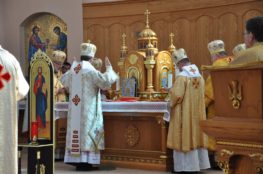Note: This post is the overdue third part of a “series” of posts on Greek Catholicism in the West. The first two installments are available here and here.
The centuries-old relationship between Latin and Greek Catholics has been a tumultuous one. Although this is not the place to get into the fraught history of Latin interventionism in Greek—indeed all Eastern—Catholic affairs, most are now aware of the gross injustices suffered by Greek Catholics in the West, particularly in the United States at the hands of Bishop Ireland, Rome’s greatest gift to the Eastern Orthodox Church. Since at least the time of the Second Vatican Council, Latin/Greek relations have improved significantly, though most contemporary Catholics, if they know anything of the Christian East at all, remain content to view Greek Catholicism (Ukrainian, Ruthenian, Melkite, etc.) as little more than an “exotic attraction,” something “interesting” to pay notice to now and again, but not much else. Traditional Latin Catholics have a more complicated relationship with the Greeks. Although there often exists a surface admiration for the East’s liturgical ethos, traditionalists are largely dismissive of, if not directly hostile toward, Greek Catholic traditions such as married clergy or the East’s cool reception of certain Western theological and spiritual currents. What this means in practice is that while there have been a number of conservative Latin Catholics who have made a new home in Greek Catholicism as a way of escaping the liturgical, spiritual, and moral rot which has beset much of contemporary Latin Catholicism, Latin traditionalists have often found it hard to accept Greek Catholicism as anything more than a second-best option in the midst of a first-rate crisis.
To be fair, Greek Catholicism does bear some of the blame for ongoing tensions with Latin Catholics, particularly traditionalists. Greek Catholics, like their separated Orthodox brethren, have a tendency to see their ways—liturgical, spiritual, and theological—as automatically superior to Latin ways, sometimes for very superficial reasons. And again, like the Orthodox, there is still a tendency for Greek Catholicism to present itself as an ethnic museum unwelcoming to those with the wrong last name or family heritage. The good news is that a lot of this is starting to change, though perhaps not as quickly as necessary. A quarter-century ago, when I was still a boy, there were more than a few Eastern priests who would openly ask visiting Latin Catholics, “Don’t you have your own church to go to?” This at a time when many Greek Catholic parishes were beginning to suffer severe demographic decline while the younger generation desired recognition and respect, not accusations and finger-pointing, with their Latin coreligionists.
I make mention of this not to indict either Latin or Greek Catholicism, but to identify some of the difficulties which still attend to Latin/Greek relations and to suggest that the way forward, even in the West, is not to sustain an artificial partition between the two but to build a culture of mutual appreciation and respect. This is easier said than done. As I discussed in an earlier post, Greek Catholics in the West are still struggling to restore their full liturgical patrimony and clarify their authentic traditions. Latin Catholicism is in the midst of a similar struggle, though one that is far more complicated and contentious by several orders of magnitude. The fact that there are certain ideologically charged Latin theologians who are content to “cherry pick” from the Christian East in order to do an apparent end-run around extant Catholic doctrine certainly doesn’t help matters. Instead of seeing the Eastern patrimony in its integrity, they view it—or the views of certain individual Eastern Fathers—as a reservoir for renovationism in the Roman Church.
As for the more narrow relationship between Greek Catholics and Latin traditionalists, let me say this. Setting aside the occasionally uncharitable manner in which some traditionalists address “things Eastern,” there is, I believe, a great deal traditionalists can learn from the Greeks, particularly with respect to taking a wider view of the universal Church’s patrimony. Greek Catholics, for their part, should be respectful of traditionalist desires to restore the Roman Rite and preserve the Christian West’s theological heritage, which includes giving a certain primacy to the writings of St. Thomas Aquinas and Scholasticism. None of this means that Greek Catholics should become Thomists or feel compelled to import certain Latin liturgical practices (e.g., low Mass), however.
In closing, I want to point out that there are some serious challenges on the horizon which Latins and Greeks need to be aware of. With rumors in the air of a forthcoming synod intended to address the issue of clerical celibacy, it is inevitable that the Christian East will be dragged into the middle of an ongoing disciplinary dogfight within the Roman Church. Many unedifying things will probably be said about the married priesthood by proponents of clerical celibacy while the other side romanticizes Eastern praxis in splendid isolation from on-the-ground realities. At the ecumenical level, the West continues to face pressure from the Russian Orthodox Church to throw the Ukrainian Greek Catholic Church under the proverbial bus in the interest of building “stronger ties” between first and third Rome. The more Rome behaves in a manner which alienates loyal Greek Catholics while ignoring their concrete historical situation, the less trustful Greek Catholics are likely to be of Latins in general. Such a result would be a slap in the face to the desire of numerous popes, from Leo XIII to John Paul II, that Greek Catholicism has an authentic, unique, and integral role to play in the universal Church of Christ.




December 21, 2015
I think Pope Francis is perhaps the most sympathetic to Roman and Eastern traditionalists and I wouldn’t be surprised if he ends the irregular relationship that SSPX has with Rome and grants Patriarchal status to the Catholic Eastern Churches.
December 21, 2015
I think that we are seeing the beginnings of such a move on the part of His Holiness, Pope Francis, in meeting with all of the Eastern Catholic bishops within hours of His elevation to the papacy, and in ordering an end to curial restrictions on the married priesthood for Eastern Catholic churches. One can hope that He may go farther in that direction.
December 21, 2015
Many Neo-Con Roman Catholics are having a conniption about the possibility of married men getting ordained in the Latin Church. Father Z has post about the next rumored synod:
http://wdtprs.com/blog/2015/12/could-this-be-the-the-next-synods-theme-married-priests/
I don’t know if Father Z is trying to be cute or is just being plain disingenuous with his comments about setting up a dating service for priests, but he should know that it is highly unlikely the Pope will allow men already ordained to the priesthood to get married. The synod, if it does occur, will focus on whether or not to allow married RC men to be ordained to the priesthood.
I find the comments in Father Z’s post even more disturbing and some of them downright repugnant. Most of the commenters are very ignorant about a married priesthood. They claim married priests will tell their wives what was said in the confessional. This is ridiculous as a priest who did this, married or celibate, would automatically incur excommunication.
They also harp on that tired old canard that a married priest will have less time for parishioners. In my experience married priests have been more available to me than celibate priests. The size of a parish determines the availability of a priest rather than whether or not they are married with children. Since RC priests have thousands of parishioners, it is much more difficult to meet with them than an EC or EO married priest who usually has less than a hundred parishioners.
Also, the canonist Ed Peters believes all married men who are ordained, deacons and priests, should be continent after ordination. He claims this is in canon law. I know nothing about canon law, but I have read that other canonists dispute this claim. Even if Peters is correct, canon law is not doctrine and can be changed. Married priests and deacons have been having intercourse with their wives for thousands of years, and they aren’t going to stop because of some canon lawyer’s interpretation.
Finally, I believe many people as seen on Father Z’s blog post don’t know what the two states of life traditionally are. They are marriage or monasticism, not marriage or priesthood. I believe an erroneous theology has grown around many RC’s conception of the priesthood due to their beliefs that all priests must be celibate. They make the priest into some superhuman being cut off from the rest of the Church. These ideas are in no way good for relations between Roman Catholics and Eastern Christians whether Catholic or Orthodox.
December 21, 2015
So, Latin Catholics are going on about married priests in a way that is insulting to the Christian East? The sky is blue.
Without getting into too much here, I do think there are certain drawbacks to the married-priest model in the West which any bishop ought to keep in mind before encouraging his seminarians to marry. I certainly don’t buy into the idea that a married priesthood in a panacea for the vocations crisis one finds today in the Roman Church. Whether or not Latin Catholics should maintain the discipline of clerical celibacy is, of course, for them to decide. Due to longstanding practice and tradition, I believe they should retain the discipline. Moreover, any shift in praxis now will be perceived by liberals (and the wider world) as further Church capitulation to the cult of sexuality even if there are, at bottom, other justifications for disposing of near-mandatory celibacy.
If the Roman Church allowed Latin Catholic priests to marry after ordination it would be a revolution, even against Eastern praxis. Although there have been abuses in the past with respect to ordination and (re)marriage, the common witness of all of Eastern Christendom is that men must be married before taking orders, typically the diaconate but sometimes the subdiaconate as well.
As for the continence thing, I know of no extant canon which states that. I only know of some arguments, put forth by Latin Catholic clergy, that the East “broke with tradition” regarding post-marriage continence has been beaten down by subsequent scholarship. It’s something of a myth which still circulates because it is meant to both “explain away” contemporary Orthodox and Eastern Catholic praxis and and provide further “proof” that the Latin Church alone is the one holding strong and fast to “the tradition.”
December 21, 2015
Excellent post and great comments.
I agree that the usually superb Fr. Z. Is unreasonable about clerical celibacy, but in fairness, it’s tough not to be. For example, as the son of a married deacon, Dr. Peters’ unqualified crusade for diaconal continence is, emotionally, a strike at my very existence and my parents’ marriage. The issue touches at the heart of the nature of spiritual fatherhood, and the nature of the human being in a uniquely intimate way.
I also think that a lot of the Latin celibacy fire-eaters are driven by a need to not “lose the debate” to Protestantism, especially amongst converts from the same. The rest of us are just ground under in their debates.